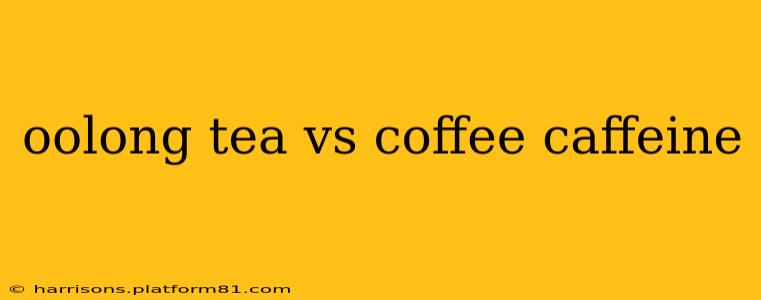Coffee and oolong tea are both popular beverages enjoyed worldwide for their stimulating effects, primarily due to their caffeine content. But which one packs a bigger caffeine punch, and what are the other key differences? This comprehensive comparison will delve into the caffeine levels, health benefits, and overall characteristics of these two beloved drinks.
How Much Caffeine is in Oolong Tea vs. Coffee?
The caffeine content in both oolong tea and coffee varies considerably depending on several factors. Let's break them down:
Coffee:
- Type of Bean: Arabica beans generally contain less caffeine than Robusta beans.
- Brewing Method: Stronger brews, like espresso, naturally contain more caffeine than a weaker drip coffee.
- Bean Roast: The roasting process doesn't significantly impact caffeine levels.
- Serving Size: An 8-ounce cup of brewed coffee typically contains anywhere from 80 to 170 mg of caffeine.
Oolong Tea:
- Oxidation Level: The oxidation level during processing significantly affects caffeine concentration. Lightly oxidized oolong teas tend to have higher caffeine levels than darker, more oxidized varieties.
- Brewing Time: Longer steeping times generally extract more caffeine.
- Leaf Quantity: Using more tea leaves per cup will also result in a higher caffeine concentration.
- Serving Size: An 8-ounce cup of oolong tea usually contains between 20 and 80 mg of caffeine.
In short: Coffee generally contains significantly more caffeine than oolong tea.
Is Oolong Tea Less Acidic Than Coffee?
Yes, oolong tea is generally considered less acidic than coffee. Coffee's acidity comes from chlorogenic acids and other organic acids. While oolong tea does contain some acids, its overall pH level is usually higher (less acidic) than coffee's. This difference can be important for individuals with sensitive stomachs or acid reflux.
Does Oolong Tea Have the Same Benefits as Coffee?
Both oolong tea and coffee offer various potential health benefits, though the specific compounds responsible differ.
Coffee's Benefits: Often associated with improved alertness, cognitive function, and a reduced risk of certain diseases like type 2 diabetes and Parkinson's disease. However, excessive coffee consumption can lead to anxiety, insomnia, and digestive issues.
Oolong Tea's Benefits: Rich in antioxidants (polyphenols), oolong tea is linked to potential benefits for heart health, weight management, and improved gut health. It's also known for its potential to boost metabolism. Like coffee, excessive consumption can lead to sleep disturbances for some individuals.
Both beverages should be consumed in moderation.
What Are the Differences in Taste Between Oolong Tea and Coffee?
This is largely subjective, but coffee tends to have a bolder, more robust flavor profile, ranging from bitter to sweet, depending on the bean and roast. Oolong tea, on the other hand, boasts a wide array of flavor notes, from floral and fruity to nutty and slightly sweet. The taste of oolong tea can significantly vary depending on the oxidation level and the specific tea leaves used.
Which Drink Is Better for Weight Loss?
Both oolong tea and coffee have been linked to potential weight loss benefits, but the mechanisms differ. Coffee's caffeine content can boost metabolism and increase fat burning, while oolong tea's polyphenols might help with fat oxidation. However, neither drink is a magic bullet for weight loss. A balanced diet and regular exercise remain crucial for sustainable weight management.
Is Oolong Tea Better for Anxiety?
While both coffee and oolong tea contain caffeine, which can exacerbate anxiety in some individuals, oolong tea generally contains less caffeine. This means it might be a better choice for those prone to anxiety compared to coffee. However, individual sensitivities vary, and it's crucial to pay attention to your own body's response.
Conclusion: The Best Choice Depends on Your Preferences
Ultimately, the "better" drink – oolong tea or coffee – depends entirely on individual preferences, health considerations, and desired effects. Consider your caffeine tolerance, sensitivity to acidity, and desired flavor profile when making your choice. Both beverages offer unique benefits and can be enjoyed as part of a balanced lifestyle.
